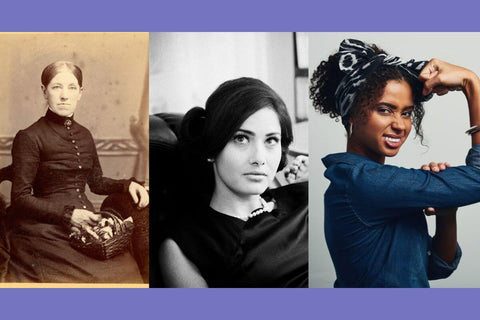Menopause Through Time: A Journey through American History and Changing Attitudes
Mid 19th Century Views on Menopause
In the early 1900s, menopause was often deemed a disease—a condition warranting medical and sometimes even psychiatric intervention. Women in the Victorian age were often prescribed blood letting by the ankles and were deemed unstable. They would be encouraged to avoid reading novels, going to parties, or dancing. The conversation around menopause was minimal, with conversations about women's health being considered taboo.
This era, deeply ingrained in the medicalization of women's bodies, often approached menopause as a problem needing a cure rather than a natural phase of life. Publications from the time, reflecting broader societal views, painted menopause in grim lights, associating it with inevitable decline and loss of femininity.
Mid-20th Century: Shifting Perceptions and Hormone Treatments
By the mid-20th century, attitudes towards menopause started showing signs of change, albeit slowly. The development and introduction of hormone replacement therapy (HRT) in the 1960s marked a significant turning point. HRT offered a novel way of managing menopausal symptoms, including weight gain, which became a beacon for many women navigating this life stage.
However, the rise of HRT also perpetuated the notion that menopause was a deficiency needing correction. It wasn't until the feminist health movement of the 1970s and '80s that a more empowering narrative began to emerge, challenging the medical community's pathologizing of menopause and advocating for more nuanced, informed approaches to menopausal care. Most of us know that the season of HRT treatment was fairly short lived and that as women we took monumental steps backwards when the Women’s Health Initiative announced their findings in 2002 that HRT was not safe and would cause increased risks for breast cancer and heart disease.
Late 2010s to Present Day: A New Dawn
In the last decade, there has been a seismic shift in how society and the medical community view and discuss menopause. The narrative has moved from one of disease and decline to a focus on wellness, quality of life, and the natural progression of aging. Today, menopause is increasingly seen in a positive light, with discussions encompassing not just the challenges but also the liberating aspects of this life stage.
The internet and social media have played pivotal roles in demystifying menopause, offering platforms for sharing experiences, advice, and information. We’ve even seen menopause commercials during the Super Bowl, an American “holiday” once believed to be only for and about men.
Women have demanded more transparency. In the same way that miscarriages are no longer taboo to discuss, women are sharing their anguish and coping mechanisms with each other, and a slew of women have begun creating the solutions they so badly need. Topics such as weight loss in menopause, once discussed in hushed tones, are now openly explored, with an emphasis on healthy lifestyle adjustments rather than on viewing weight changes as a problem to be fixed.
Weight Loss and Menopause Today
Attitudes towards weight loss in menopause today are informed by a broader understanding of women's health needs. The focus is on supporting overall health and wellness through balanced nutrition, regular exercise, and mental health support. The conversation around menopause and weight management is nuanced, recognizing the complex interplay of hormonal changes, metabolism, and aging.
The history of menopause in America has undergone a profound evolution—from stigmatization and medicalization to empowerment and acceptance. Menopause history tells a broader story about society's changing attitudes towards women's health and aging. As we continue to challenge outdated perceptions and advocate for respectful, informed care, the narrative around menopause, including aspects like weight loss, will only grow richer and more empowering.
Menopause is not merely a historical footnote but a testament to the resilience, strength, and diversity of women's experiences through time. By understanding the past, we can pave the way for a future where menopause is embraced as a natural, affirming stage of life, rich with possibility and promise.
https://www.rcn.org.uk/library-exhibitions/Womens-health-wandering-womb#:~:text=A%20Victorian%20woman%20going%20through,going%20to%20parties%20and%20dancing.




